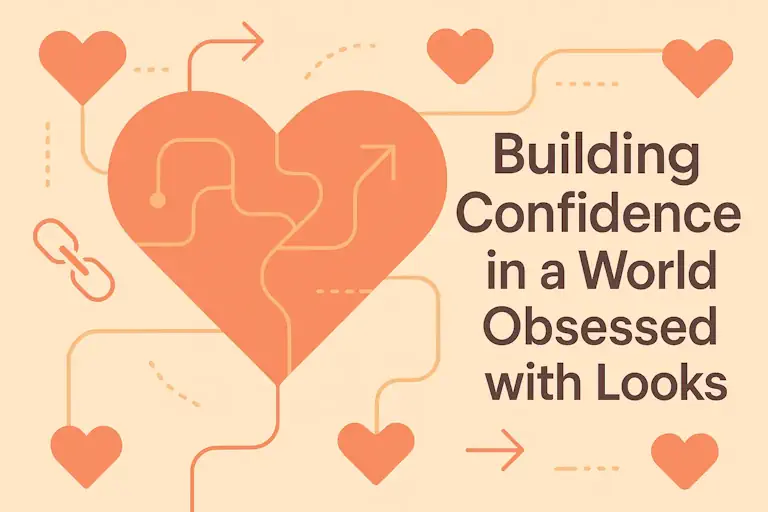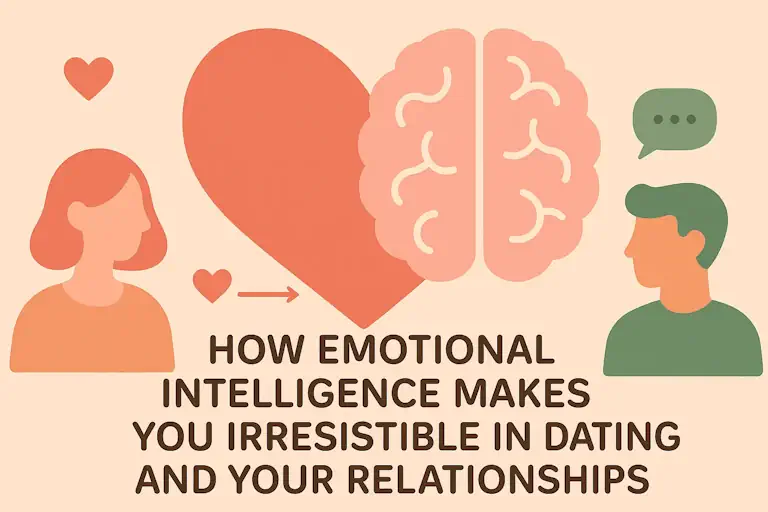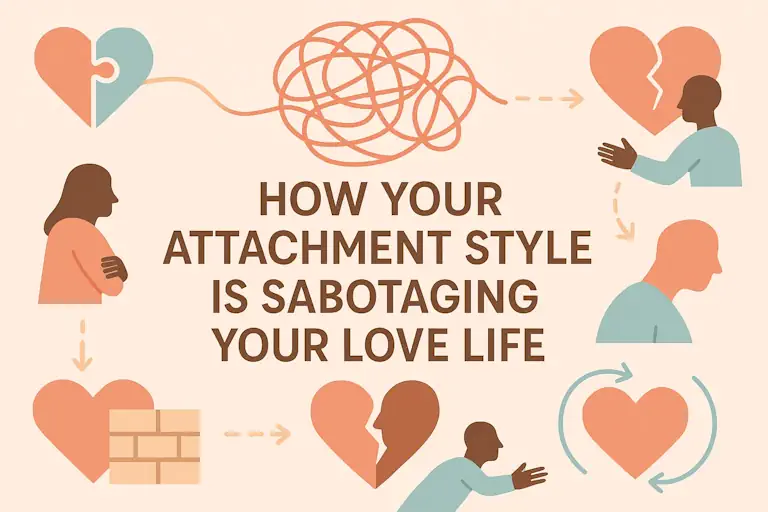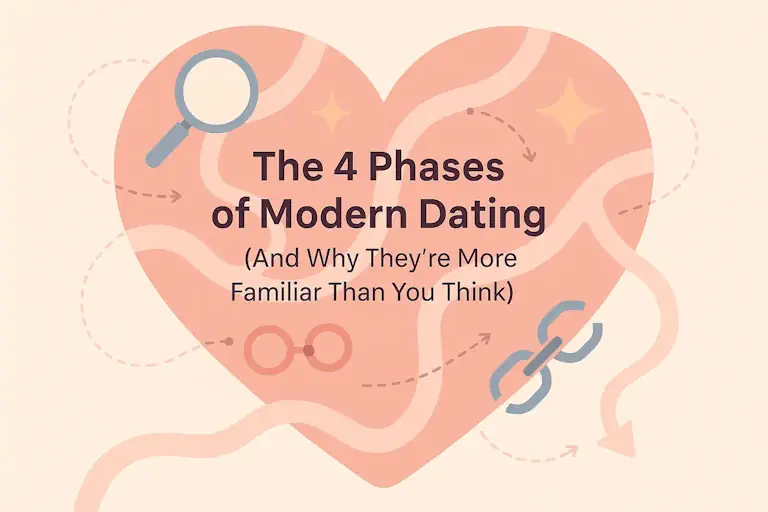In a world where filters, editing apps, and carefully curated social media feeds have become the norm, building authentic confidence feels almost revolutionary. But how do we actually do it? This article breaks down the reality of developing self-confidence that goes beyond surface-level advice.
Confidence isn’t just about how you look - it shows up in how you flirt, set boundaries, and move through the natural stages of dating. Knowing where you are in that journey can actually help you feel more grounded and less second-guess-y.
Table of Contents
Let's Just Say It: We're All a Bit Obsessed
Let me paint you a picture: You wake up, open your front-facing camera by accident (already a personal attack), and before you've had coffee, your brain is like, "Damn, how do I look worse than my sleep paralysis demon?"
We live in a society that's deeply entangled with aesthetics. You can literally Photoshop your life now. You're not just competing with people in your city or your school anymore - you're up against the hottest angles of strangers who don't even look like themselves.
And look, it's not entirely our fault. Evolution wired us to be attracted to certain physical traits. Symmetry? Signals health. Clear skin? Possibly fertility. Strong jawlines? Probably protection (or TikTok clout). But just because it's biological doesn't mean it's not a dumpster fire for our self-worth.
When Confidence Feels Like a Costume
The worst advice I ever got was, "Just be confident." Cool. Got it. I'll just go to the store and pick some up. Maybe in the same aisle as world peace and a metabolism that speeds up with age.
The truth is, most of us aren't born confident. We grow it - awkwardly, unevenly, and usually after being pushed into some deeply humbling situations. (Shoutout to the time I wore a knockoff crop top and got told I had "brave energy" by a guy who looked like his breath smelled like Monster Energy and Axe body spray.)
Confidence, for me, started feeling real when I stopped tying it to how I looked and started tying it to how I felt. Not always easy. Not linear. But more sustainable than spiraling every time my chin decides to show up twice in one selfie.
"Confidence isn't about believing you're perfect. It's about being willing to show up despite your imperfections."- Brené Brown
What Body Positivity Gets Right (and Wrong)
Body positivity was meant to liberate us. And in some ways, it has. It gave us Lizzo twerking joyfully on stage. It gave us plus-size mannequins in athletic wear. It gave us the right to exist without apology.
But the movement also morphed. Somewhere along the way, it started feeling like another expectation. Now, not only do you need to be thin/hot/clear-skinned, but if you're not, you better LOVE your body 24/7.
Some mornings I look at my thighs and think, "Yes, powerful tree trunks that carry me." Other times it's just, "Why do you jiggle when I'm not even moving?"
That's okay. Self-love doesn't mean you're obsessed with every inch of yourself all the time. It means you're on your own side, even when your brain is being a little bitch.
Did You Know?
According to research published in the Journal of Health Psychology, focusing on what your body can do rather than how it looks leads to significantly greater body satisfaction. This "functionality-focused" approach has been shown to be more effective than traditional body positivity for many people[1].
Why It's So Hard to Love Ourselves
Let's talk psychology for a sec. Self-worth, according to actual science, is shaped early. If you grew up with parents who criticized your weight or made comments like, "You'd be so pretty if you just lost a little," congrats - you probably internalized some fun stuff.
Social comparison theory also explains a lot. It's the idea that we judge ourselves based on how we think we stack up to others[2]. Enter: Instagram. TikTok. Dating apps with endless swipes of people who apparently do squats for breakfast.
Studies have found that social media use correlates strongly with body dissatisfaction - especially for women and femme-presenting folks[3].
And even if you know all this intellectually, it doesn't always help emotionally. There are days when logic doesn't win. But awareness? That's a start.
Real Talk: How I Unfollowed the Ideal
Here's something small that changed everything for me: I unfollowed every account that made me feel like sh*t. If I saw someone and immediately spiraled into "Why don't I look like that?" I hit unfollow. Not because they did anything wrong. But because my brain wasn't ready.
I started following people who looked like me. Who posted bad angles. Who showed rolls and razor bumps and pimples and weird bellybuttons. It didn't cure everything. But it helped me normalize the idea that bodies just... exist. And they don't need to look like they were carved by the gods to be worthy of love, fun, pleasure, or a swipe right.
Take Action: Social Media Audit
Take 15 minutes today to scroll through your social media feeds and honestly assess how each account makes you feel. If an account consistently makes you feel inadequate or triggers negative self-talk, consider unfollowing or muting. Your digital environment shapes your thoughts more than you might realize.
Okay, So How Do You Actually Build Confidence?
Alright, time to get practical. If you googled this, you're not just here for vibes. You want a damn answer. Here's what's helped me (and some of my therapist friends agree):
- Practice Neutrality First
If you can't say "I love my body," try "This is my body. It gets me through the day."
Start neutral. Love can come later[4]. - Move for Joy, Not Punishment
Exercise should not feel like penance for eating cake. Go dancing. Take a walk. Stretch while watching Netflix. Your body deserves movement, not punishment. - Wear Clothes That Fit Now
Not when you lose 10 lbs. Not when you get ripped. Now. Clothes should fit you, not the other way around. - Talk to Yourself Like You Would Your Best Friend
You wouldn't call your friend a "fat failure" for skipping the gym, right? Don't say it to yourself either. - Spend Time with People Who Don't Obsess Over Looks
If your social group treats thinness or hotness like currency, you're gonna feel broke. Find people who see beyond that.
Final Thoughts: The Body Isn't the Whole Story
Look, I won't lie to you and say looks don't matter at all in dating. We're visual creatures. Attraction is real. But confidence is hot in a way that's hard to fake. It seeps out in how you talk, how you stand, how you look someone in the eye. You can be awkward and still magnetic. You can have acne and still be radiant. You can be fat and sexy as hell.
Let's stop treating our bodies like the most interesting thing about us. You are not a before-and-after photo. You are a full damn person.
Reader Stories
"The advice about wearing clothes that fit NOW instead of waiting until I 'deserved' them changed my dating life. I finally stopped hiding and started showing up as myself. Met my partner three months later!"
"The social media audit suggestion was eye-opening. I didn't realize how much my feed was impacting my self-image until I cleaned it up. Dating has been so much less stressful since I stopped comparing myself to unrealistic standards."
Frequently Asked Questions: Building Dating Confidence
How long does it take to build genuine confidence?
Building genuine confidence isn't a linear process with a set timeline. Most people experience it as an ongoing journey with ups and downs. Small changes (like adjusting who you follow on social media) can bring immediate relief, while deeper confidence often develops gradually over months of practicing self-compassion and challenging negative thought patterns. Research suggests that consistent habit changes typically take anywhere from 66 to 254 days to become automatic, which may be a helpful framework for establishing new confidence-building routines.
Does confidence really matter in dating?
Yes, confidence consistently ranks among the most attractive qualities in dating across genders and sexual orientations. This doesn't mean overconfidence or arrogance, but rather a comfortable sense of self-assurance. Confidence affects everything from your posture to how you engage in conversation, and it signals to potential partners that you value yourself. When you're confident, you're also more likely to set healthy boundaries, communicate your needs clearly, and approach rejection with resilience – all crucial skills for successful dating.
How can I appear confident on a first date even if I'm nervous?
Try these practical tips: 1) Prepare a few open-ended questions in advance to avoid awkward silences, 2) Wear clothes you feel comfortable and good in rather than something trendy but anxiety-producing, 3) Practice power posing for 2 minutes before your date (research suggests this can actually reduce stress hormones), 4) Focus on being curious about your date rather than worried about being judged, 5) Acknowledge your nervousness if appropriate – authenticity is attractive and often puts both people at ease, and 6) Remember that your date is probably nervous too.
Is it possible to feel confident while still working on yourself?
Absolutely! Genuine confidence isn't about being perfect or "finished" – it's about accepting yourself as a work in progress. The most confident people often openly acknowledge their flaws and areas for growth. In fact, the willingness to admit you're still learning and evolving is itself a sign of deep confidence. You can simultaneously recognize aspects of yourself you want to improve while appreciating your inherent worthiness and the progress you've already made. This balanced perspective – being both proud of who you are and excited about who you're becoming – is actually the healthiest form of confidence.
References
- Alleva, J. M., Martijn, C., Van Breukelen, G. J. P., Jansen, A., & Karos, K. (2015). Expand Your Horizon: A programme that improves body image and reduces self-objectification by training women to focus on body functionality. Body Image, 15, 81-89.
- Festinger, L. (1954). A theory of social comparison processes. Human Relations, 7(2), 117-140.
- Fardouly, J., & Vartanian, L. R. (2016). Social media and body image concerns: Current research and future directions. Current Opinion in Psychology, 9, 1-5.
- Neff, K. D. (2011). Self-compassion, self-esteem, and well-being. Social and Personality Psychology Compass, 5(1), 1-12.
 The Modern Dater
The Modern Dater




